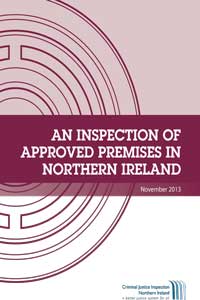An Inspection of Approved Premises in Northern Ireland
Publication: 14/11/13

Approved premises providing significant contribution to Northern Ireland's public protection arrangements
The use of approved premises to assist offenders to resettle back into society helps reduce the risk of individuals reoffending and strengthens public protection arrangements in Northern Ireland according to a new inspection report published today by Criminal Justice Inspection Northern Ireland (CJI).
"This latest report indicates the approved premises in Northern Ireland were meeting each of the six standards tested in this inspection including the resources available to undertaken high risk work with offenders, risk assessments, monitoring and surveillance and risk management and enforcement," said Brendan McGuigan, Chief Inspector of Criminal Justice in Northern Ireland.
"Inspectors found that individuals who settled successfully reduced their likelihood of reoffending score while living in the approved premises," he said.
The Chief Inspector added that operational processes such as alcohol and drug testing of residents and the out-of-hours responses provided by the Police Service of Northern Ireland and the Probation Board for Northern Ireland were also better than at the time of the last inspection in 2008.
"Statutory agencies have also worked alongside the approved premises to help raise standards and support the staff working within these facilities to manage offenders more effectively.
"The level of co-operation between the voluntary organisations that run approved premises and the statutory agencies they engage with was also found to have increased and is regarded as a model of best practice," said Mr McGuigan.
Inspectors found that demand for approved premises places had increased following the introduction of the Criminal Justice (Northern Ireland) Order 2008, which created new sentences that required statutory supervision of more released prisoners, and the suspension of the Prisoner Assessment Unit (PAU) in 2011.
This situation creates a constant challenge for the management teams within the approved premises as they seek to balance the demand for beds from bail applicants and prisoners applying for home leave against that of individuals requiring supervision on their release from prison.
Mr McGuigan indicated that some approved premises had experienced difficulties in the face of the introduction of increasingly demanding governance standards such as financial and personnel procedures.
"Inspectors however found no evidence that public safety was compromised or that residents were affected by these governance concerns. Approved premises practice has progressed since CJI's last inspection and these facilities continue to play a vital role in delivering public protection and providing offenders who want to change their behaviour with a new start," he said.
In conclusion, Mr McGuigan said that while it remained difficult to reconcile local community concerns about the location of approved premises with the reality of just how difficult it is for some offenders to find suitable accommodation, the vital contribution made by approved premises to public protection arrangements should be acknowledged.